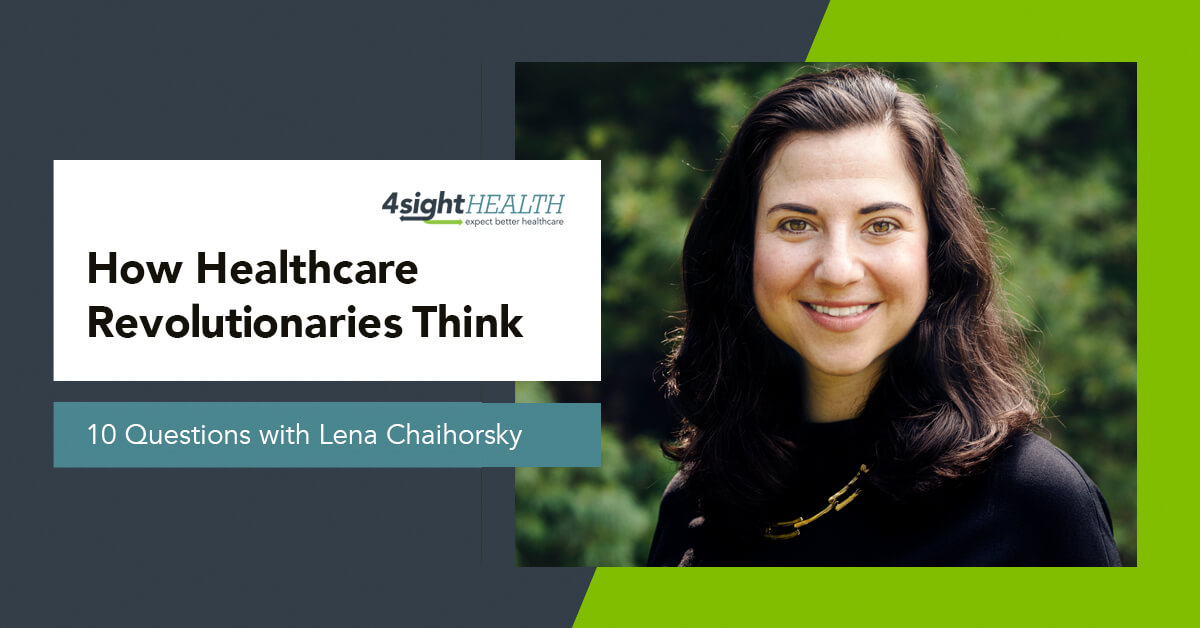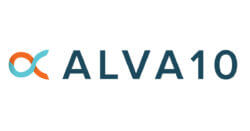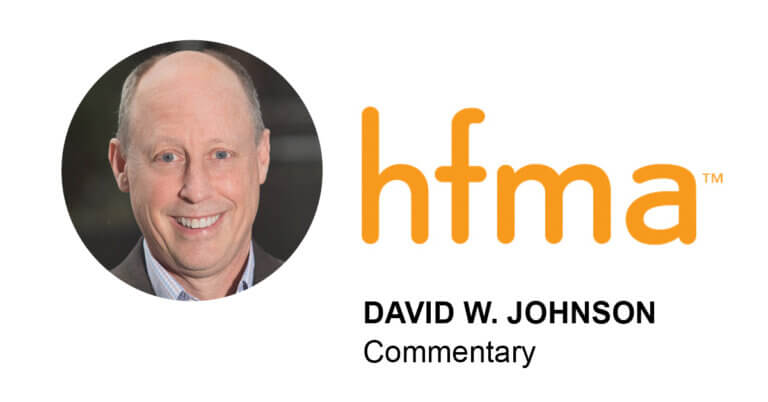November 1, 2022

How Healthcare Revolutionaries Think: 10 Questions with Lena Chaihorsky
Welcome to the latest installment of 4sight Health’s series, How Healthcare Revolutionaries Think. Our interview series profiles healthcare instigators who believe that outcomes matter, customers count and value rules.
If you’re like most patients, when your doctor tells you that you probably have “X,” and that he or she is going to treat your “X” with “Y,” you take it for granted that “Y” is the best treatment for “X.” Instead of thanking the doctor, your first response should be: “How do you know ‘Y’ will work on my ‘X’?”
Their answer, if they’re honest, is: “Well, it worked on my last patient who had ‘X’.” To Lena Chaihorsky, that answer isn’t good enough. Not by a long shot.
Chaihorsky is co-founder and vice president of payer innovation at Alva10, a Cambridge, Mass.-based company that brings payers and diagnostic-testing companies together to facilitate the development of tests that ultimately bring down the cost of care. The tests do that by determining whether high-cost interventions and drugs will work on patients before they’re administered. If they don’t work, don’t spend the money on them. Alva10’s goal is to make this step a regular part of a patient’s healthcare journey, scaling the practice of precision medicine.
I spoke with Chaihorsky about precision medicine, the industry’s receptivity to what Alva10 wants to accomplish and what drives her to succeed.
1. Lena, how would you define a healthcare revolutionary?
Chaihorsky: My definition of a revolutionary is someone who sacrifices their personal comfort in some way and who puts themselves on the line, especially in the early days when no one believes them. They do that to move forward a completely different vision for the future, a future they are absolutely convinced is better. We use a lot of terms like entrepreneur, visionary, genius. We use those terms to describe the heroes we talk about. But to me, a revolutionary is different and special. It’s reserved for the few because of the element of sacrifice. Revolution in general means a complete change, right? I don’t think that comes without sacrifice.
2. Are we talking about professional risk? Personal risk? Both?
Chaihorsky: Well, it could be either. Sometimes I think it’s both. When you step outside of yourself to create something new the world hasn’t seen yet, you probably are sacrificing a lot of personal comfort. You’re not taking jobs that could pay better because you’re doing this thing. You’re not getting certain professional accolades because you’re doing this thing. That has a financial component. But it also has a family component. It’s time away from your family. It’s not living the easy-breezy life.
3. Who in your mind decided not to live the easy-breezy life? Past or present, who’s your favorite healthcare revolutionary?
Chaihorsky: I’m a lover of history. I’m reaching back for this one. Lev Zilber. He may not be a household name. He was a Russian immunologist who was arrested three times during the Stalin era. Imagine that, right? Three times in various freezing labor camps. He’s remembered for establishing the entire epidemiology of tick-borne encephalitis. And while his research teams were out there getting all of these awards for the fact that they had just charted the epidemiology of this condition, he was actually arrested a third time on trumped-up charges.
And this third time, when he was in a prison hospital in freezing north Russia, he encountered a disease that was called pellagra, which is basically a deficiency of vitamin B3, that usually leads to death. And he is my favorite healthcare revolutionary because he was able to get a local fungus to produce a yeast, and he used this yeast as a source of vitamins to treat prisoners who would have died from this disease.
Imagine that. You’re this successful scientist, and your success makes you enemies. Your team is getting all this recognition for this enormous feat you performed, while you end up serving another prison sentence. It’s probably one of the darkest periods of your life. And in your darkest hour, you create something that’s absolutely lifesaving for so many people.
I think about Dr. Zilber a lot. It gives me perspective.
4. I’d be thinking about how I was going to stay alive the next day. But he’s thinking what can I do to save everyone around me, right? Are you a healthcare revolutionary? Are you the next Lev Zilber?
Chaihorsky: I am not the next Lev Zilber. But there was an element of sacrifice to how we founded and bootstrapped Alva10, and I am proud of that. This is a company founded by two women who left financially lucrative positions to start a company from scratch because we believe this company needed to exist. Healthcare needed a voice that was not owned by anyone to go between the payer industry and the diagnostic industry, translating payers’ clinical economic problems into diagnostic solutions.
It would have been easier to do things differently or frankly not to do them at all. We’re working towards the vision, and the world hasn’t totally shifted yet. The progress that we’ve made and the signals that we’re seeing in the industry are highly encouraging. But today, I think of myself as a missionary, and the mission hasn’t been completed yet. Healthcare revolutionary is a title that only gets bestowed after the fact.
5. Speaking of titles, where did the name Alva10 come from? It’s very sci-fi sounding. Like a space station or a distant planet?
 Chaihorsky: The genesis is very much here on earth. When I was 13 or 14, I read a biography of Thomas Edison and learned that his middle name was Alva. In college, I learned how many scientific experiments were failures. I thought it would be cool to build a global database of failure so that any scientist from around the world could type in their specifics and learn from the mistakes of others. This was sort of my first business idea. I wanted to call the database Alva in honor of Thomas Edison.
Chaihorsky: The genesis is very much here on earth. When I was 13 or 14, I read a biography of Thomas Edison and learned that his middle name was Alva. In college, I learned how many scientific experiments were failures. I thought it would be cool to build a global database of failure so that any scientist from around the world could type in their specifics and learn from the mistakes of others. This was sort of my first business idea. I wanted to call the database Alva in honor of Thomas Edison.
When it came time to name our company, I felt like I had this good name, but I wasn’t sure if it was a fit or if my business partner would like it. Hannah (Mamuszka) actually loved it and commented on how appropriate Thomas Edison’s quote that “he had not failed 10,000 times, he just found 10,000 ways that didn’t work” was for what our company is attempting to do in diagnostics. We took a chance on this funky name, and Alva10 was born.
6. You’re 35. You had this idea when you were 13 or 14. That means you held onto this idea for 21 or 22 years. Were you waiting more than 20 years to use it? Or did it just pop back into your head when you needed to name the company?
Chaihorsky: I remember that day like it was yesterday. We were sitting in a hotel lobby in Chicago. We were scribbling down ideas, just like you would if you were trying to come up with the right name for a baby or pet. Nothing felt right. Then it popped into my head, and I said, “Well, I have a name?” I’m happy to see it used. It goes to show how deeply personal companies and missions are, and how any creative process benefits from teamwork.
7. Let’s talk about the space that Alva10 is in. Precision medicine on the surface is a no-brainer. Custom health or treatment plans for patients based on their genetic profiles. Yet it’s far from being practiced universally. Where is the breakdown?
Chaihorsky: Our chief medical officer, Blake Long, M.D., says physicians historically look at patients and ask, “How are these patients the same?” That’s because they’re looking for patterns or similarities they can use to identify the treatment. This patient looks like that patient. That worked for that patient, so it should work for this patient. We’re assigning treatments based on the average. You have rheumatoid arthritis? Take Humira because it works for most patients.
Our knowledge of genomics now forces the question, “How is this patient different from the last patient who I saw or from this category of patients?” Treatment plans should come from those insights. It’s that twist that happens before the doctor applies a particular therapy to the patient. That is where precision medicine needs to live.
It doesn’t live there for a few reasons. Foundationally, precision medicine isn’t taught very much in medical schools as a fundamental aspect of medicine. We need to integrate precision medicine into medical education in a totally different way. Secondly, healthcare, and specifically the billing and payment system, isn’t set up to deliver precision medicine to patients.
8. We like to say at 4sight Health that we get the care we pay for, and if we don’t like the care, we need to change the payment system. Tell me more about the incentives and disincentives to use precision medicine?
Chaihorsky: Now, we value treatment far more than we value diagnosis and prevention. Using diagnostics to figure out who’s at risk for developing cancer or to make sure someone’s on the right drug versus the drug that yields the biggest rebate isn’t a technical challenge for the precision medicine field. But it is a huge challenge for our healthcare system that operates on a one-year actuarial cycle and contains a variety of middlemen and players with competing financial interests. We have to overcome those challenges. We need to be very conscious about the kind of healthcare tools we put onto the market to center patient healthcare priorities over financial interests.
We need to think of diagnostics as the GPS to your care plan. Like I said, the healthcare industry values treatment much more than diagnosis and prevention. And look at where that’s gotten us. We’re not using our GPS, what we are doing is more like trial and error. We’re not charting the most efficient course of care for the patients. I’d say we’re about 20 years away from using that GPS for everyone.
9. Doctors are one part of the equation. Two other parts of the equation are life sciences companies and payers — those who make the diagnostic tests and those who pay for the diagnostic tests. How do you get the other two parts on board?
Chaihorsky: We sit between the diagnostic industry and the payer industry. The hardest part is bringing the payers halfway. I have to explain the value of these diagnostics. Explain the economic problem, how payers are going to save money by using them, get the payer on board. Payers do accept that, but they want certain things. They want certain types of clinical evidence. They want these diagnostics to check certain boxes.
Then we have to bring the diagnostic companies halfway. We have to guide them to perform the checklist so to speak, to run the studies, be more thorough, more robust, more capital efficient, make it easy for the payer to say, “OK, I’m convinced in your value. I will join you for this next part. I’m going to partner with you to ensure you make it through this canyon of early commercialization, so that you get into the onto the market successfully so I can use your test in my population and obtain that benefit.”
But when we get both sides to the midpoint, good things happen for patients.
10. On an unrelated note. You’re Russian. Do people ask you about what’s happening in Ukraine?
Chaihorsky: I get asked about it all the time. First of all, every part of me is against the war and the atrocities in Ukraine. We have family in Odesa. It’s a reality I live with every day. How do I handle it? I handle it first by explaining the gravity of the situation and the immense role the U.S. is playing, of which I’m very proud. I point people to resources and places people can donate. I think people are more likely to donate after they run into someone with a personal story or connection to the people of Ukraine.
I was born in St. Petersburg. My parents spent 10 years getting themselves and me out of Russia. It took an unbelievable amount of persistence, faith, and sheer personal courage. I was two and a half when I came here. I call myself very lucky. I definitely don’t feel pressure to succeed per se, but what I do feel is incredible opportunity. That says a lot about my parents and the way they positioned America to me. They gifted me a life in a free country and encouraged me to contribute. It’s one of the reasons I chose an entrepreneurial path for myself. I want to take advantage of the opportunity to truly contribute to the country that I’m so deeply blessed to live in.
Burda’s Final Bit
After you talk with Lena, you realize how much you take for granted. You take it for granted that doctors know what they’re doing. You take it for granted that your health insurer will cover the right treatment. You even take for granted that democracy will be here tomorrow. None of those are guarantees.
Lena knows that from both her professional and certainly personal experience. She is willing to sacrifice for what she believes in to improve the health and clinical outcomes for everyone as individual patients. Are you?
Read More Interviews with Healthcare Revolutionaries
- July 2022: David Nash, M.D.
- June 2022: Esther Dyson
- April 2022: Meghan Conroy
- March 2022: Adrianne Nickerson
- February 2022: David Snow
- January 2022: Kristen Valdes
- October 2021: Glen Tullman
- September 2021: David Greenberg and Dave Jacobs
- August 2021: Jeff Jones
- July 2021: Scott Powder
- June 2021: Robert Pearl, M.D.
- May 2021: Kurt Waltenbaugh
- April 2021: Jon Pearce
- March 2021: Thompson Aderinkomi
- February 2021: Gaurov Dayal, M.D.
Lena Chaihorsky is the co-founder and Vice President of Payer Innovation at Alva10. With a background in biology and mathematics from Tufts, she is a skilled healthcare executive with a proven track record of developing and executing value based reimbursement strategies for diagnostics companies. Lena has extensive leadership experience in sales, national contracting, and all aspects of reimbursement within start-up and global companies, most recently AmniSure and QIAGEN. Lena also contributes to Alva10’s public speaking and writing efforts, leveraging her unique perspective on payer business and innovation models and their intersections with the diagnostics industry. Her work on commercial approaches to health economics data analysis led to her appointment as co-chair of the World Economic Forum’s workgroup dedicated to the economics of rare disease data federations.




